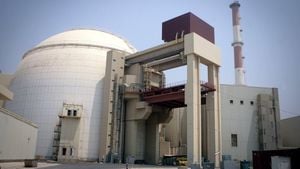BAKU, Azerbaijan — Under the looming shadows of climate catastrophes and urgent demands for financial aid, the 29th session of the Conference of the Parties to the United Nations Framework Convention on Climate Change—commonly known as COP29—has kicked off, fueling discussions on how developing countries can receive the funds they desperately need to combat climate change.
This year, African leaders are at the forefront, advocating for significant international support to tackle the mounting climate threats facing their nations. The consensus is clear: as developing countries wrestle with the perennial issues of floods, droughts, and other climate-related crises, their financial resources grow thinner.
President Denis Sassou Nguesso of the Republic of Congo articulated the urgency during the summit: “We are particularly concerned about climate finance.” He exemplified the plight of nations rich in biodiversity—like the Congo Basin, which houses the world’s second-largest rainforest—that require rigorous financing from developed countries to fund climate adaptation initiatives without accruing more debt.
The path to securing climate funds remains rocky. It took nearly 13 years for developed nations to reach the promised yearly contributions of $100 billion, which were methodically laid out during the 2009 UN climate talks, only hitting the target last year. Consequently, world leaders are now exploring new objectives to finance climate action, with the development of the New Collective Quantitative Goal (NCQG) topping the agenda at COP29.
President Nguesso asserted, “The NCQG must be based on scientific data and the needs of developing countries, which amount to trillions.” Various leaders from African nations, including the Presidents of Ghana and Côte d’Ivoire, echoed similar sentiments, pressing for financial mechanisms, such as concessional financing, which wouldn’t exacerbate their debt burdens.
To add to the sense of urgency, East Africa has recently faced unprecedented flooding, causing significant devastation across multiple countries. Ethiopian President Taye Atske Selassie emphasized the need for expedited funding disbursements to assist vulnerable communities and stated, “We are very concerned about the delay in disbursing these funds.” Tackling such delays is not merely about finance; it’s about climate justice, as many argue those most responsible for the climate crisis should bear the costs of addressing its impacts.
“Climate finance is a justice issue, and we must make certain the loss and damage fund does not become a shell of itself,” warned Philip Isdor Mpango, the Vice President of Tanzania.
Meanwhile, the financial discussions are overshadowed by the pressing reality of extreme weather events. This year alone, projections suggest we could see global temperatures rise by 1.5 degrees Celsius, bringing us perilously close to the thresholds outlined by the Paris Agreement. With this backdrop, leaders are clear: financial support must not be delayed, as every moment counts.
Ambassador Ali Mohamed, Kenya’s Special Envoy for Climate Change, highlighted the opportunity within the climate finance discussions. "Africa could potentially create millions of green jobs with the right funding and support,” he stated, noting the continent’s goal to transition away from fossil fuels and shift toward renewable energy systems.
At COP29, the mood is mixed—while there is enthusiasm for potential agreements, the specter of political instability and differing priorities among major countries adds complexity to the negotiations. Leaders from both developed and developing countries will need to find common ground if significant advancements are to be made.
This year’s talks have shown growing recognition of the importance of not just funding, but smart funding—where investments are directed toward innovative avenues such as renewable energy and sustainable development practices. For example, initiatives like the Africa Green Industrialisation Initiative and Accelerated Partnership for Renewables aim to boost investment flows to environmentally friendly projects.
Nonetheless, securing commitments from wealthier nations poses its challenges, especially as some negotiate terms aligned with their economic interests and historical emissions. For many developing nations, the memories of past promises linger, casting doubt on the sincerity of future commitments.
At the forefront of these deliberations is the pressing timeline; nations have until early next year to submit new, potentially ambitious targets for emissions reductions. Therefore, the financial mechanisms outlined at COP29 will hold significant weight for negotiations going forward.
The stakes couldn’t be higher. The success or failure of these discussions will not just shape the future of climate action but will also define economic opportunities and vulnerabilities for countless communities. While hope rings true within the COP halls, it must resonate beyond negotiations, manifesting as actionable results for people facing the effects of climate change every day.
While the atmosphere at COP29 brims with the urgency dictated by recent climate-induced tragedies, it remains to be seen whether this will galvanize actions commensurate with the need. The intersection of climate finance and equitable strategies will likely dictate the success of this summit, as well as the fortunes of many nations for years to come.



